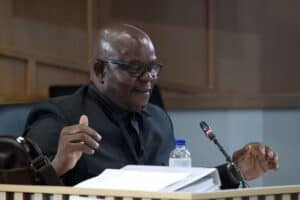Several restrictions would remain in place regardless of the level of alert for as long as the risk of transmission is present.

President Cyril Ramaphosa has shed light on what the country’s new reality will look like when the lockdown continues beyond the end of April, albeit in another format.
South Africans entered the lockdown at midnight on 26 March to prevent the spread of the Covid-19 pandemic. It was expected to end on 16 April, however, Ramaphosa announced a few days before its end it would be extended for a further two weeks.
The lockdown in its current form is expected to end on 30 April.
During his address to the nation on Thursday evening, Ramaphosa announced that beyond the end of April, a risk-adjusted strategy would be implemented to ease the current lockdown restrictions.
Five-phased approach
As part of this approach, different levels will determine the restrictions:
– Level 5 means drastic measures are required to contain the spread of the virus to save lives.
– Level 4 means some activity can be allowed to resume, subject to extreme precautions required to limit community transmission and outbreaks.
READ MORE: FULL SPEECH: Lockdown to be eased from start of May, with 5 levels to guide activities
– Level 3 involves the easing of some restrictions, including on work and social activities, to address a high risk of transmission.
– Level 2 involves the further easing of restrictions, but the maintenance of physical distancing and restrictions on some leisure and social activities to prevent a resurgence of the virus.
– Level 1 means most normal activity can resume, with precautions and health guidelines followed at all times.
“To ensure that our response to the pandemic can be as precise and targeted as possible, there will be a national level and separate levels for each province, district and metro in the country,” Ramaphosa said.
“We are currently at level 5, which requires a full national lockdown to contain the spread of the virus.
“The National Coronavirus Command Council will determine the alert level based on an assessment of the infection rate and the capacity of our health system to provide care to those who need it.”
Level 4
The president announced that from 1 May, the country would move to level 4.
Here is what level 4 looks like currently:
– Borders will remain closed to international travel, except for the repatriation of South African nationals and foreign citizens.
– No travel will be allowed between provinces, except for the transportation of goods and exceptional circumstances such as funerals.
– All gatherings, apart from funerals and for work, will remain prohibited.
– Some businesses will be allowed to resume operations under specific conditions. (These sectors are still to be announced.)
– The public is encouraged to stay at home, other than for essential personal movement, doing essential work and work in sectors that are under controlled openings.
– The elderly, and those with underlying conditions, must remain at home and take additional precautions to isolate themselves.
– People can exercise under strict public health conditions. (These conditions have still not been announced.)
– The sale of cigarettes will be permitted.
– Public transportation will continue to operate, with limitations on the number of passengers and stringent hygiene requirements, including that all passengers must wear face masks.
– The range of goods that may be sold will be extended to incorporate certain additional categories. (These must still be detailed by the relevant ministers.)
Restrictions
However, Ramaphosa did announce several restrictions would remain in place regardless of the level of alert for as long as the risk of transmission is present.
These restrictions include:
– Bars and shebeens will remain closed.
– Conference and convention centres, entertainment venues, cinemas, theatres, and concerts will remain closed.
– Concerts, sporting events, and religious, cultural and social gatherings will not be allowed until it is deemed safe for them to continue.
Ramaphosa added as the government gradually eased the restrictions, it was necessary that many of the measures to contain the spread of the virus remained in place.
“Ultimately, it is our own actions, as individuals, that will determine how quickly the virus spreads.
“If we all adhere to instructions and follow public health guidelines, we will keep the virus under control and we will not need to reinstate the most drastic restrictions,” he said.
For more news your way, download The Citizen’s app for iOS and Android.






